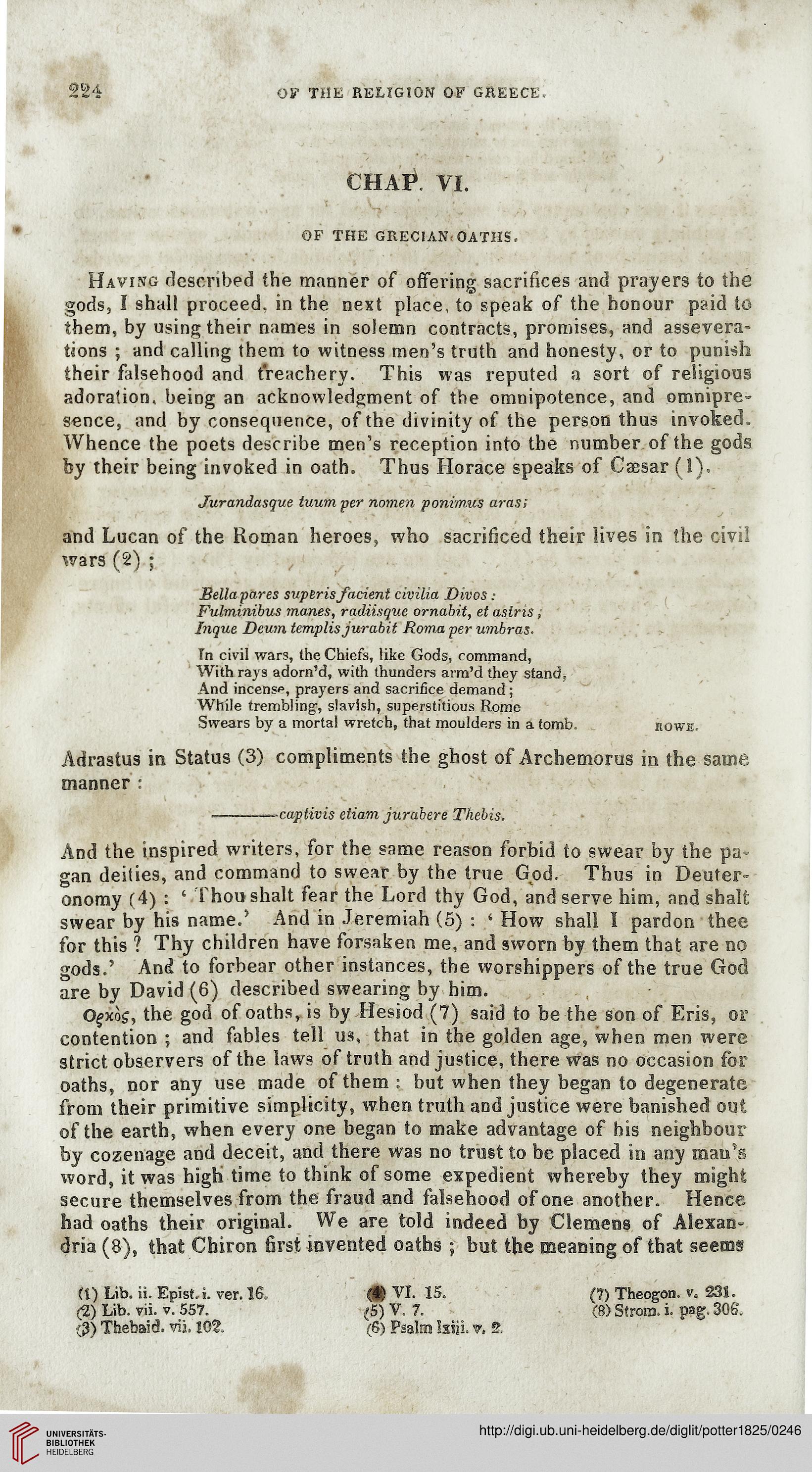224
of the religion of greece,
CHAP VI.
of the grecian< oaths.
Having described the manner of offering sacrifices and prayers to the
gods, I shall proceed, in the next place, to speak of the honour paid to
them, by using their names in solemn contracts, promises, and assevera-
tions ; and calling them to witness men's truth and honesty, or to punish
their falsehood and treachery. This was reputed a sort of religious
adoration, being an acknowledgment of the omnipotence, and omnipre-
sence, and by consequence, of the divinity of the person thus invoked.
Whence the poets describe men's reception into the number of the gods
by their being invoked in oath. Thus Horace speaks of Caesar (1).
Jurandasque tuum per nomen ponimus aras;
and Lucan of the Roman heroes, who sacrificed their lives in the civil
wars (2) ;
Bellapares superisJacient civilia Divos :
Fulminibus manes, radiisque ornabit, et astris
Inque Deum templisjurabit Roma per umbras.
In civil wars, the Chiefs, like Gods, command,
With rays adorn'd, with thunders arm'd they stand,
And incensp, prayers and sacrifice demand;
While trembling1, slavish, superstitious Rome
Swears by a mortal wretch, that moulders in a tomb. howe.
Adrastus in Status (3) compliments the ghost of Archemorus in the same
manner :
--captivis etiam jurabere Thebis.
And the inspired writers, for the same reason forbid to swear by the pa-
gan deities, and command to swear by the true God. Thus in Deuter-
onomy (4) : ' Thoushalt fear the Lord thy God, and serve him, and shalt
swear by his name.' And in Jeremiah (5) : ' How shall I pardon thee
for this ? Thy children have forsaken me, and sworn by them that are no
gods.' Ani to forbear other instances, the worshippers of the true God
are by David (6) described swearing by him.
O^xos, the god of oaths, is by Hesiod (7) said to be the son of Eris, or
contention ; and fables tell us, that in the golden age, when men were
strict observers of the laws of truth and justice, there was no occasion for
oaths, nor any use made of them : but when they began to degenerate
from their primitive simplicity, when truth and justice were banished out
of the earth, when every one began to make advantage of his neighbour
by cozenage and deceit, and there was no trust to be placed in any man's
word, it was high time to think of some expedient whereby they might
secure themselves from the fraud and falsehood of one another. Hence
had oaths their original. We are told indeed by Clemens of Alexan-
dria (8), that Chiron first invented oaths ; but the meaning of that seems
(1) Lib. ii. Epist.i. ver.l&
(2) Lib. vii. v. 557.
(3) Thebaic], vii. 102.
# VI. 15.
(5) V.7. -
(6) Psalm Isiii, 7. 5.
(7) Theogon. v. 231.
(8) Strom, i. pag. 306.
of the religion of greece,
CHAP VI.
of the grecian< oaths.
Having described the manner of offering sacrifices and prayers to the
gods, I shall proceed, in the next place, to speak of the honour paid to
them, by using their names in solemn contracts, promises, and assevera-
tions ; and calling them to witness men's truth and honesty, or to punish
their falsehood and treachery. This was reputed a sort of religious
adoration, being an acknowledgment of the omnipotence, and omnipre-
sence, and by consequence, of the divinity of the person thus invoked.
Whence the poets describe men's reception into the number of the gods
by their being invoked in oath. Thus Horace speaks of Caesar (1).
Jurandasque tuum per nomen ponimus aras;
and Lucan of the Roman heroes, who sacrificed their lives in the civil
wars (2) ;
Bellapares superisJacient civilia Divos :
Fulminibus manes, radiisque ornabit, et astris
Inque Deum templisjurabit Roma per umbras.
In civil wars, the Chiefs, like Gods, command,
With rays adorn'd, with thunders arm'd they stand,
And incensp, prayers and sacrifice demand;
While trembling1, slavish, superstitious Rome
Swears by a mortal wretch, that moulders in a tomb. howe.
Adrastus in Status (3) compliments the ghost of Archemorus in the same
manner :
--captivis etiam jurabere Thebis.
And the inspired writers, for the same reason forbid to swear by the pa-
gan deities, and command to swear by the true God. Thus in Deuter-
onomy (4) : ' Thoushalt fear the Lord thy God, and serve him, and shalt
swear by his name.' And in Jeremiah (5) : ' How shall I pardon thee
for this ? Thy children have forsaken me, and sworn by them that are no
gods.' Ani to forbear other instances, the worshippers of the true God
are by David (6) described swearing by him.
O^xos, the god of oaths, is by Hesiod (7) said to be the son of Eris, or
contention ; and fables tell us, that in the golden age, when men were
strict observers of the laws of truth and justice, there was no occasion for
oaths, nor any use made of them : but when they began to degenerate
from their primitive simplicity, when truth and justice were banished out
of the earth, when every one began to make advantage of his neighbour
by cozenage and deceit, and there was no trust to be placed in any man's
word, it was high time to think of some expedient whereby they might
secure themselves from the fraud and falsehood of one another. Hence
had oaths their original. We are told indeed by Clemens of Alexan-
dria (8), that Chiron first invented oaths ; but the meaning of that seems
(1) Lib. ii. Epist.i. ver.l&
(2) Lib. vii. v. 557.
(3) Thebaic], vii. 102.
# VI. 15.
(5) V.7. -
(6) Psalm Isiii, 7. 5.
(7) Theogon. v. 231.
(8) Strom, i. pag. 306.




